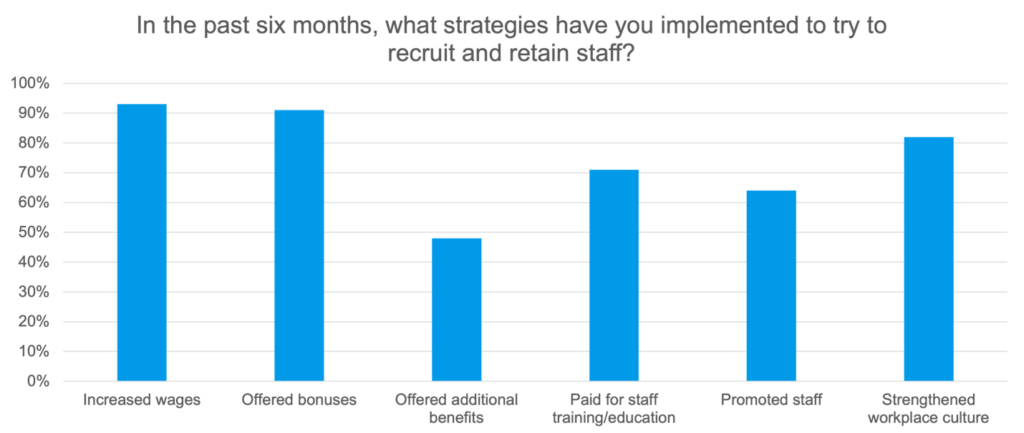The first-ever federal staffing mandate for nursing homes is looming. Skilled nursing homes that are already dealing with daunting recruitment challenges on a fixed budget will face their toughest challenge yet as CMS prepares to release its updated rules unaccompanied by additional reimbursement.
As competing priorities between the reduction of beds per room and hospital discharges cause further friction for the healthcare industry, meeting the proposed minimum of 4.1 hours per resident per day will be costly, and will require SNFs to reevaluate their workforce planning strategy.
The Federal Staffing Mandate Means That the Staffing Situation Will Only Get Worse
According to the American Health Care Association’s (AHCA) State of the Nursing Home Industry 2023 survey, 84% of nursing homes are facing moderate to high levels of staffing shortages and more than half believe the situation has worsened in the past six months. This is in spite of the fact that over 90% of nursing homes have increased wages and offered costly bonuses in that time.

With 96% of nursing homes having trouble hiring staff, it’s no surprise that healthcare talent acquisition, specifically for nursing, was the top concern listed in AHCA’s survey. Exacerbating that concern is the knowledge that in the next five years, 20% of the nursing workforce intends to retire, a rate that is outpacing new entrants to the field and that is already making planning effective workforce strategies difficult.
While hiring concerns are hitting an all-time high, so too is the desire to move away from external staffing resources. When it comes to healthcare talent acquisition, reliance on costly agency staff to fill shifts ranked as the second biggest concern of the nursing homes surveyed by AHCA.
Building a Sustainable Workforce
The reality for SNFs is that broken hiring strategies coupled with a negative sentiment toward staffing agencies is preventing the true partnerships that are needed to stabilize the industry. This reality will continue to cost nursing homes if something doesn’t change, especially once the federal staffing mandate goes into effect.
AHCA estimates that compliance with the 4.1 HPPD minimum will require more than 191,000 nurses and aides, at a total annual cost of $11.3 billion. Striving to meet this minimum will make developing an efficient workforce planning strategy more challenging than it already is for healthcare facilities that are struggling to attract, retain, and pay for nursing talent.
Reinventing Your Workforce Strategy
So, how can your facility meet the federal staffing mandate without breaking the bank and still deliver consistent, quality care? The answer is to explore new healthcare talent acquisition processes and strategic partnerships. In other words, you need a healthcare talent partner.
Our whitepaper, Reinventing Your Workforce Strategy, explains what to look for when vetting a healthcare talent partner. Topics covered in the whitepaper include:
- Full-time hiring capabilities and support
- Contracting best practices and understanding billing
- Vetting technology, services, and operational capabilities
- Knowing the differences between 1099 and W2 models
- Evaluating clinical and quality procedures and policies
The right healthcare talent partner can prepare you for the federal staffing mandate by helping you to safely supplement your workforce with contract, float, or per diem staff. They should also be able to help you hire full-time internal staff. A true healthcare talent partner will go even further by having the highest standards for credentialing and onboarding, meaning that you can be confident in who they are recommending to come into your building and care for your residents.
A healthcare talent partner should also be professional and efficient. You should receive a clear contract from them up front that has fair and transparent terms. They should also provide you with the technology you need to help you meet your goals, as well as support from a clinical quality team that’s always available for you. If the partners you are vetting can’t meet these benchmarks, you might be looking in the wrong place.
Finally, a healthcare talent partner will best serve you if they operate as a W2 business and not as a 1099 staffing agency. A healthcare talent partner that provides you with nurses and aides who are 1099 contractors is no partner at all – they are only opening you up to unnecessary risks and liability.
A healthcare talent partner that hires their nurses and aides as W2 employees better protects you from misclassification lawsuits and provides you with a workforce that is properly trained for their jobs and protected by employment laws. Amid the changes coming with the federal staffing mandate, the last thing you need to be worried about is an employee misclassification lawsuit.
Ready to Find a Healthcare Talent Partner?
A healthcare talent partner is exactly what you need to prepare your facility for the federal staffing mandate. Check out our whitepaper to learn more about how to build a flexible and sustainable workforce strategy.
